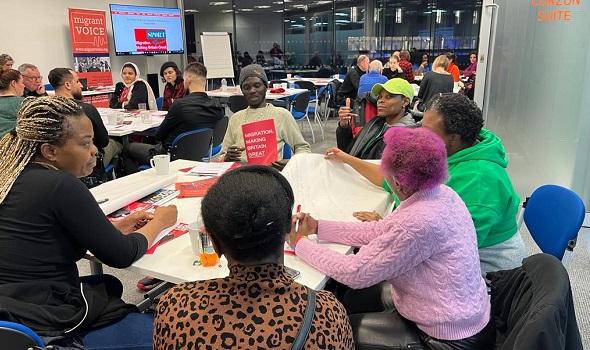Shifting the goalposts: How sport can help create a positive narrative on migration
Shifting the goalposts: How sport can help create a positive narrative on migration

A perspective on the West Midlands launch of our 'Migration. Making Britain Great' project activities.
When key members of three organisations keen on changing the migration narrative in the UK are in the same room, in an election year, best believe that the conversations would make you evaluate migration more critically.
This was the way I felt when I left Millennium Point, the venue of the ‘Migration Making Britain Great’ roundtable in Birmingham. The three organisations? Migrant Voice, a migrant-led national organisation that centres migrants in the migration debate; IMIX, a media charity organisation that supports the migration space through media partnerships; and Show Racism the Red Card, an anti-racism educational charity.
With 2024 being an election year in the UK, we can expect to hear a lot more conversation around immigration, stated Nazek Ramadan, Director of Migrant Voice in her opening remarks.
“Migrants are going to be used and abused. It is important to stand up and speak up about the contributions of migrants to the country. This is how we will challenge the negative portrayal of migrants,” she emphasised, which is why this year, Migrant Voice is using sports as a rallying point to shine light on migration issues.
As if to pick up from there, Gary Pluck, IMIX’s regional communications coordinator (West Midlands) emphasised the unique role that the media plays in shaping the migration narrative. This is because many of the British voters are undecided when it comes to the migration debate, and it behoves organisations within the migration ecosystem to transcend their echo chambers and speak to those who need to hear it more.
“...Our plan is to use sports and the massive impact immigrants have had in that sector to challenge the narrative. We are trying to go beyond the echo chamber we are familiar with,” he said.
Ged Grebby of Show Racism the Red Card spoke of their long relationship with Migrant Voice, establishing past work on documentaries and campaigns to end racism.
“We are in an election year and there will be more anti-migrant rhetoric.” However, as an organisation, they will continue to highlight migrants’ contributions to different sectors in the UK, like the National Health Service (NHS) and sports, even as they continue their school education drive across the country.
“We are currently working with Migrant Voice on a new film, and an educational booklet on migration focusing on positive stories with a focus on football as a strategy. The Premier League benefits from migrants from across the world. The educational resource will be available for teachers across the UK on our education hub.”
To emphasise the critical role of migrants, Koyar Kurdy, a Mixed Martial Arts fighter originally from Kurdistan, spoke on the challenges and opportunities that sports holds for migrants.
“Everywhere I go, it is because of sports. The beauty of sports is bringing different people from different places together even if they cannot speak English. Through sports, we see that all the colours look nice when we put them together but don’t look as nice when each is alone,” Kurdy said.
Next up was Joy Warrington of brap—a charity reshaping the way we think and do equality—who hinted on the organisation’s soon-to-be released report Too Hot to Handle on how racism manifests in the NHS.
“I think this is a very dangerous time for this country. With all the challenges today, people look for others to blame. There are different ways people fan the embers of hate. No one wakes up and says ‘today, I will be hateful.’”
After the speakers, there were group discussions, divided according to the tables in the room. Groups were tasked with the responsibility of thinking around ways sports can be used to tackle racism and hostility towards migrants and how as individuals they can contribute to changing the narrative.
Nazek Ramadan, wrapped up the evening quite nicely, recounting a chat she once had with a migrant on hatred.
“Why do they hate us so much when they don’t even know us?” The person asked her.
“Maybe when they know you, they won’t hate you,” Nazek responded. She highlighted the importance of finding home, of creating your own ‘home’ belonging in a new country.
“This is our home now and we need to belong to the community,” Nazek said, centring the importance of the meeting; it was not solely about Migrant Voice’s 2024 programme, or the collaborating organisations trying to make a difference, it was more about creating a safe space for migrants. And by extension, it was more about how the UK could become like that room, a home for migrants to find comfort, no longer quivering in fear of another policy every election cycle.
Temitayo Olofinlua is a writer and editor based in Birmingham. She is also the founder of StoriesClick, a storytelling brand in Birmingham.


